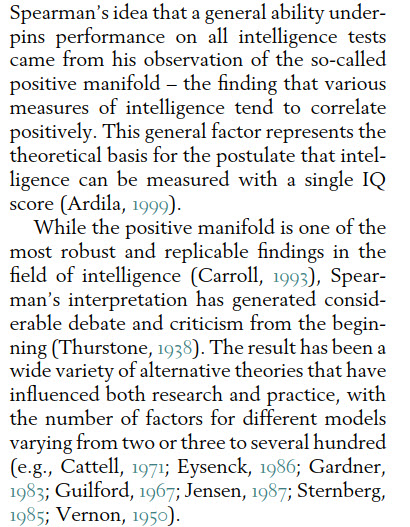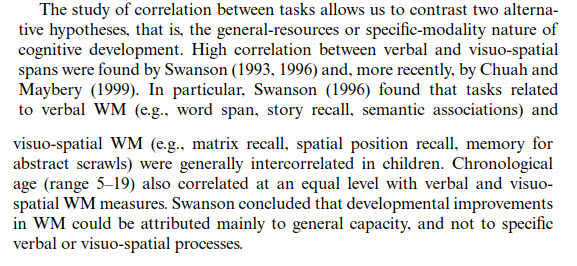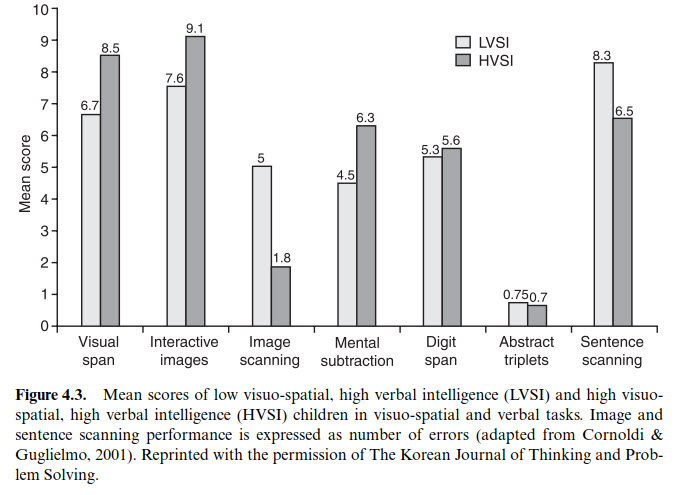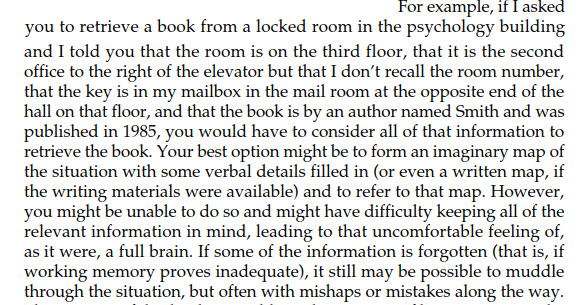What is the link between someone's visual and spatial working memory, their verbal working memory, and different types of cognitive abilities or tasks? More specifically, intelligence tests (WAIS, Stanford Binet, etc.) and would this relate to educational outcomes in different fields (maybe SAT scores, graduation rates in different fields, and GPA, etc.)? Is there a relationship between these variables? Some cite working memory as the most important predictor of early academic success.
Somebody who has a strong verbal working memory may generally perform well on other types of verbal tasks included on intelligence tests: vocabulary, verbal reasoning, analogies, antynoms, etc. And be better suited to learn about fields such as literature, biology, foreign languages, etc. because there is a lot of linguistic mastery required in these disciplines.
Or on the other hand, if somebody has a strong visual-spatial working memory they may generally perform well on intelligence tests on other types of visual-spatial tasks that also recruit reasoning ability and long-term memory. And would be better suited to learning about fields such as physics, mathematics, art, architecture, etc. because there is more of a visual-spatial component in these disciplines.
Of course, there are many other factors that affect ability and learning. Working memory would be a small determinant but a determinant nonetheless. Furthermore, there is research which shows a link between spatial ability and achievement in STEM subjects up to graduate level studies for example.
Cognitive abilities from both of these broad areas (overall visual-spatial and verbal ability) certainly overlap highly — same with other types of reasoning abilities such as numerical and logical. However, I assume each area has a bias as to what types of cognitive abilities are used more.
There seems to be a very strong correlation between the two types of working memory or short-term memory. That's what I wanted to find out mainly: What is the relationship between the different types of working memory or short-term memory and other types of reasoning abilities (non-working memory reasoning tasks including verbal ability, numerical, spatial, etc.)? Are the different measures of short-term and working memory measuring approximately the same thing?
How common is the occurance of individuals that have poor verbal working memory and high verbal reasoning scores on intelligence tests for example? How about for visual-spatial working memory and non-working memory visual-spatial scores on intelligence tests?
I've read a few papers on this subject but am unsure of the answer.
Hopefully, someone can point me in the right direction. Thanks.
References:
Timothy F. Brady, Talia Konkle, George A. Alvarez; A review of visual memory capacity: Beyond individual items and toward structured representations. Journal of Vision 2011;11(5):4. doi: 10.1167/11.5.4.
Teixeira, Rosani Aparecida Antunes, Zachi, Elaine Cristina, Roque, Daniela Tsubota, Taub, Anita, & Ventura, Dora Fix. (2011). Memory span measured by the spatial span tests of the Cambridge Neuropsychological Test Automated Battery in a group of Brazilian children and adolescents. Dementia & Neuropsychologia, 5(2), 129-134. https://dx.doi.org/10.1590/S1980-57642011DN05020012
Spatial Ability: A Neglected Talent in Educational and Occupational Settings Harrison J. Kell & David Lubinski Roeper Review Vol. 35 , Iss. 4,2013



